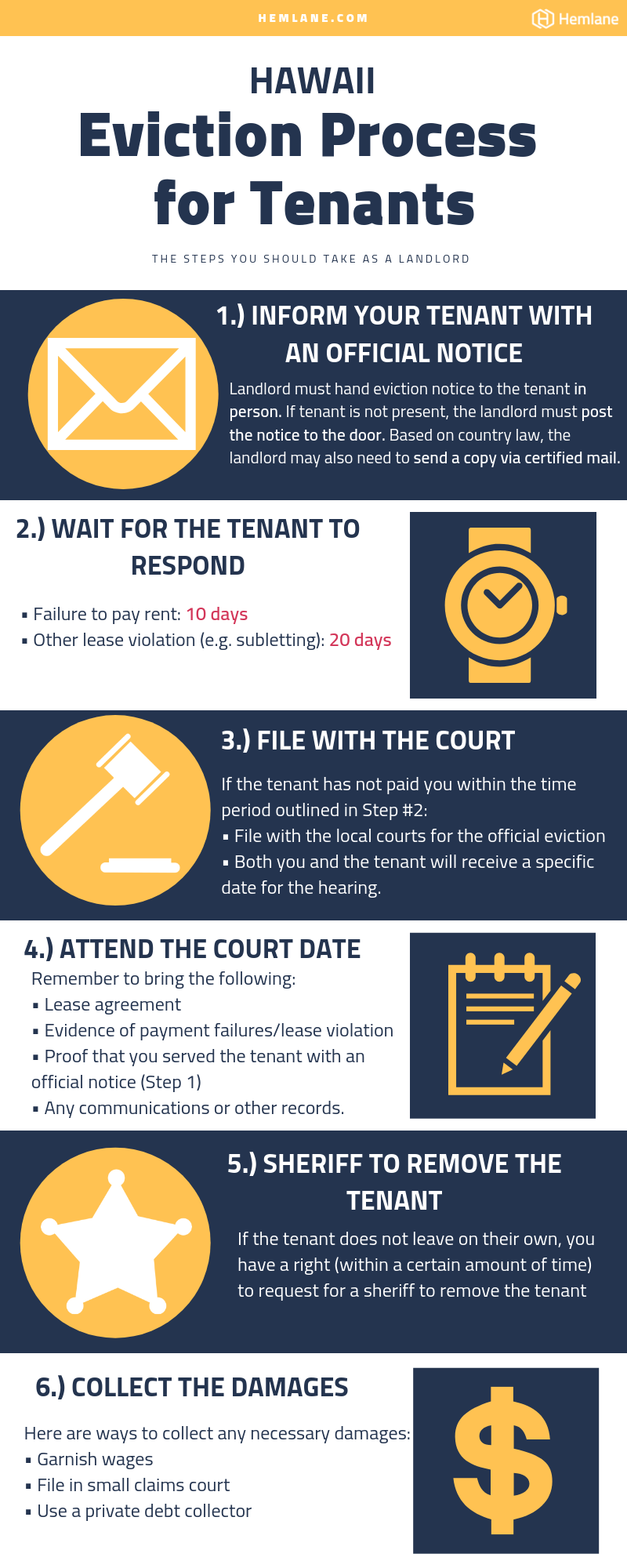Hawaii Tenant-Landlord Law
![[Hawaii]](https://resources.hemlane.com/content/images/2019/06/Hawaii.png)
Fair Housing
The Fair Housing Act was created in order to ensure that everyone is treated equally during the housing process. It protects tenants from discrimination when seraching for a rental property. At the federal level the Fair Housing Act protects the following classes…
- Race
- Color
- National Origin
- Religion
- Sex
- Familial Status
- Disability
Learn about fair housing at the federal level here /landlord-must-know-fair-housing/
In addition to federal fair housing laws, Hawaii’s state laws prohibit housing discrimination based on…
- Ancestry
- Marital status
- Age
- HIV infection or sexual orientation
- Gender identity
(HRS § 515-3)
Security Deposits
- Maximum amount landlord can charge: Security deposit cannot exceed one months rent, plus an amount agreed upon by the tenant and landlord to compensate for any damages caused by a pet animal unless it is a service animal. (§521-44(b))
- Security deposit interest: Landlord may not impose a tax charge, the deposit is the tenants money held by the landlord. (Hawaii Residential Landlord-Tenant Code, p.25)
- Returning security deposit: Landlord must return security deposit 14 days after the termination of the rental agreement. (§521-44(c))
- Failure to return security deposit within 14 days: If the landlord does not provide written notice for withholding the security deposit, the landlord must return the entirety of the deposit regardless of any costs needed to remedy damages caused by the tenant. (§521-44(c)(g) and (h))
Rent and Late Fees
- Rent is due: Rent is payable at the time and date agreed on by the tenant and landlord. If no agreement is made in the lease, then rent is due at the beginning of every month. (§521-21)
- Rent increase notice: Month to month leases require a 45 day written notice before a landlord can increase the rent. For tenants that are less than month to month, a 15 day written notice is required. (§521-21)
- Late fees: Allowed, but there is no law in place for it. The lease should specify what the penalty for late fees is, as agreed upon between the tenant and landlord. (page 4, Contract provisions (a))
- Prepaid rent: Landlord may not require or receive payments exceeding first months rent and a security deposit. No part of the security deposit shall be used as payment of last month’s rent, unless the tenant and landlord both agree to it and if the tenant provides 45 days notice prior to moving out. (§521-44)
- Tenants ability to withhold rent: If landlord does not provide essential services or habitability, then they may withhold rent under these circumstances. (§521-78)
- Tenant ability to deduct rent §521-64
- The landlord upon written notification from the department of health or other state or county agencies that there exists a condition which constitutes a health or safety violation has 5 business days to complete repairs.
- If landlord fails to remedy condition after 5 business days of a written notification, then the tenant may immediately do the repairs and submit a receipt to the landlord. The tenant may deduct $500 or one months rent whichever is greater.
- Landlord ability to recover court and attorneys fees: Rental agreement may provide for the payment by the tenant of the costs of a lawsuit, for unpaid rent, and reasonable attorney’s fees if they do not exceed 25% of the unpaid rent. (§521-35)
Notices and Entry
- Notice to terminate fixed end lease: No notice requirement, termination is automatic. (p. 13 handbook)
- Notice to terminate yearly lease with no end date: No law.
- Notice to terminate month-to-month lease: Landlord must give 45 days notice in writing, while tenant must give 28 days notice in writing.§521-71
- Notice to terminate week-to-week lease: 10 days written notice.
- Immediate termination of tenancy: If the tenant threatens or causes damage to any person or constitutes a violation of section §521-51
- Notice of termination of all other leases for non-payment: 5 days to pay rent or the rental agreement will be terminated. §521-68
- Notice to terminate for nuances: If nuance is not remedied after 24 hours, landlord may terminate tenancy after 5 days.§666-3
- Required notice before entry: Landlord must give 2 day notice before entering dwelling unit, and may only enter for necessary concerns such as repairs, alterations or improvements, as well as to exhibit the unit to prospective purchasers, mortgagers, or tenants.§521-53
- Tenant notice of extended absence: the tenant must notify the landlord of any anticipated extended absence from the dwelling unit no later than the first day of such absence, if agreed upon in the rental agreement. §521-54
- Tenant’s responsibility to inform landlord: Tenant must notify landlord immediately of any defective conditions on the premise, which the tenant believes is not known to the landlord. §521-55
- Lockouts and utility shut offs: Both are not allowed, and if the landlord does so the tenant may recover an amount equal to 2 months rent or free occupancy for two months, and the cost of the lawsuit, including reasonable attorney's fees. §521-63
Disclosures
- Disclosing authorized personnel to tenant: Landlord must give the names and addresses of any individual who manages the premise, or any person who is allowed to act on the behalf of the owner for things such as receiving rent, notices, demands, as well as providing services. (§521-43(a)(b))
- Landlord duties; (§521-42)
- Compliance; comply with building and housing laws which would affect health and safety.
- Repairs; make all repairs necessary to keep premise livable.
- Common areas; Keep common areas in clean and safe condition.
- Maintenance; Maintain electrical, plumbing and all other facilities.
- Trash; Provide trash cans for the removal of normal amount of trash.
- Water; provide running wanter
- Abandoned personal property of tenant: Landlord may sell, store, or donate any items of value the tenant has left behind following the natural expiration of the term or if the tenant has quit the premise. Landlord may only due so after 15 days of mailing a notice to the past-tenant. (§521-56)
Eviction Laws

-
When it is failure to pay rent, the tenant has 10 days to pay you otherwise the eviction notice can be filed with the courts.
-
When there is another lease violation (e.g. subletting), the tenant has 10 days to remedy the conditions. If the tenant does not, the landlord may file an eviction notice 20 additional days later. (§521-72) Otherwise the eviction notice will be filed with the courts.
-
Eviction cases allowed in small claims court: No, residential landlord-tenant cases must be filed in the district court. (§633-27)
-
Limits: Cases for the recovery of money cannot exceed $5,000, cases which involve returning of leased or rented property worth less than $5,000. (§633-27)
-
Statute of limitations: Tenant or landlord can take legal action within the first 6 years following a written or oral rental agreement.(§657-1 )
For more information on Hawaii Landlord Tenant laws please visit their website here.
As the situation with COVID-19 continues to evolve, the moratorium on foreclosures and evictions will continue to impact millions of rental properties across the country. For the most up to date information on this legislation, as well as to see if your city or county has additional directives in place, please contact your local representative.




